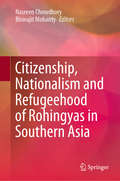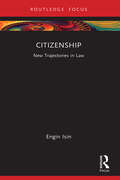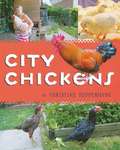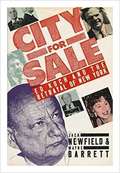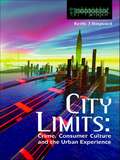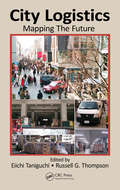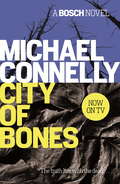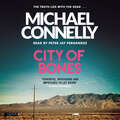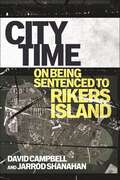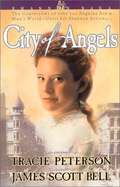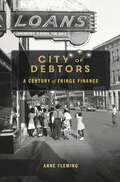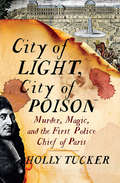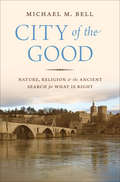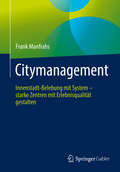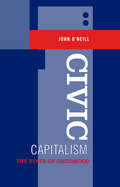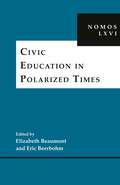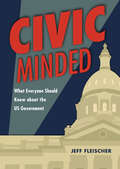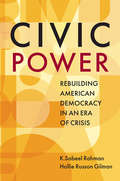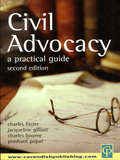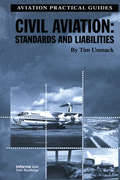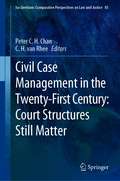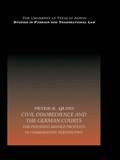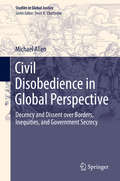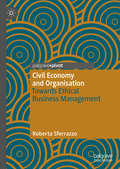- Table View
- List View
Citizenship, Alienage and the Modern Constitutional State
by Helen IrvingTo have a nationality is a human right. But between the nineteenth and mid-twentieth centuries, virtually every country in the world adopted laws that stripped citizenship from women who married foreign men. Despite the resulting hardships and even statelessness experienced by married women, it took until 1957 for the international community to condemn the practice, with the adoption of the United Nations Convention on the Nationality of Married Women. Citizenship, Alienage, and the Modern Constitutional State tells the important yet neglected story of marital denaturalization from a comparative perspective. Examining denaturalization laws and their impact on women around the world, with a focus on Australia, Britain, Canada, Ireland, New Zealand and the United States, it advances a concept of citizenship as profoundly personal and existential. In doing so, it sheds light on both a specific chapter of legal history and the theory of citizenship in general.
Citizenship, Nationalism and Refugeehood of Rohingyas in Southern Asia
by Nasreen Chowdhory Biswajit MohantyThis book provides an in-depth investigation of citizenship and nationalism in connection with the Rohingya community. It analyses the processes of production of statelessness in South Asia in general, and with regard to the Rohingyas in particular. Following the persecution of the Rohingya community in Myanmar (Burma) by the military and the Buddhist militia, a host of texts, mostly descriptive, have examined the historical, political and cultural roots of the genocidal massacre and the flight of its victims to South Asia and South-East Asian countries. The UNHCR reports describe the plight of Rohingyas during and after their journey, while other works focus on the political-economic roots of this ethnic conflict and its consequences for the Rohingyas. To date, very few theoretical insights have been provided on the Rohingya issue. This book seeks to fill that gap, and explores a dialogue between the state and its citizens and non-citizens that results in the production of statelessness. In theoretical terms, the book addresses the construction of citizens and non-citizens on the part of the state, and the process of symbolic othering, achieved through various state practices couched in terms of nationalism. Extensive case studies from India, Myanmar and Bangladesh provide the foundation for a robust theoretical argument. Given its scope, the book will be of interest to students, academics and researchers with a focus on political economy in South Asia in general and/or refugee studies in particular.
Citizenship: New Trajectories in Law (ISSN)
by Engin IsinThis book outlines a critical theory of citizenship, with an emphasis on how citizenship institutes power relations and organises the rights and obligations of those who become its subjects.Whether it is the question of the rights of animals, children, migrants, minorities, mothers, or mountains, and whether such rights are protected or guaranteed by national law, international law, or human rights law, the issue of citizenship has already indelibly marked the 21st century. As an institution, citizenship governs the relationship between a polity and its peoples by dividing them into citizens and noncitizens, with differentiated rights and obligations. So necessarily, this book argues, citizenship is an institution of domination and emancipation that brings into play the struggles of those who want to protect certain privileges and the struggles of those who are against being caught in either second-class or noncitizen categories. Deconstructing dominant theories and practices of citizenship, a critical theory of citizenship must, therefore, not only analyse intersecting rights, but also connect citizenship to these broader social struggles. For it is these struggles, the book maintains, that give meaning to citizenship itself.The book will be of interest to scholars and students in sociolegal studies, sociology, politics, and as well as those working in citizenship, migration, and refugee studies.
City For Sale: Ed Koch And The Betrayal Of New York
by Jack Newfield Wayne BarrettOffers a behind-the-scenes look at the Koch administration and the New York City political machine, profiling the personalities involved in the many scandalous events
City Limits: Crime, Consumer Culture and the Urban Experience
by Keith HaywardCity Limits contributes to a growing body of work under the umbrella of 'cultural criminology', which attempts to bring an appreciation of cultural change to an understanding of crime in late modernity (Hayward and Young 2004). Hayward presents an ambitious theoretical analysis that attempts to inspire a 'cultural approach' to understanding the 'crime-city nexus' and, in particular, to re-address 'strain' and the concept of 'relative deprivation' in the context of a culture of consumption. The book incorporates an impressive array of literature from beyond the boundaries of traditional criminology - including urban studies, social theory and, most strikingly, from art and architectural criticism - illustrating a multidisciplinary approach. This provides for a challenging and enlightening read, with a particularly important emphasis on the impact of consumer culture on the lived urban experience and spatial dynamics of the city and, in turn, for an understanding of transgression and criminality. Runner-up for the British Society of Criminology Book Prize (2004).
City Logistics: Mapping The Future
by Eiichi Taniguchi Russell G. ThompsonCity Logistics: Mapping The Future examines the key concepts of city logistics along with the associated implementation issues, methodologies, and policy measures. Chronicling the growth of city logistics as a discipline and how planning and policy have improved practice over the last ten years, it details the technologies, policies, and plans that
City Of Bones (Harry Bosch Series #8)
by Michael ConnellyThe outstanding eighth Harry Bosch thriller from the award-winning No. 1 bestselling author of The Lincoln Lawyer. City of Bones is featured in Amazon Prime's BOSCH TV series.When the bones of a boy are found scattered in the Hollywood Hills, Harry Bosch is drawn into a case that brings up dark memories from his past. Unearthing hidden stories, he finds the child's identity and reconstructs his fractured life, determined that he won't be forgotten. At the same time, a new love affair with a female cop begins to blossom - until a stunningly blown mission leaves him in more trouble than ever before. The investigation races to a shocking conclusion and leaves Bosch on the brink of an unimaginable decision . . .
City Of Bones (Harry Bosch Series #8)
by Michael ConnellyWhen the bones of a boy are found scattered in the Hollywood Hills, Harry Bosch is drawn into a case that brings up dark memories from his past. Unearthing hidden stories, he finds the child's identity and reconstructs his fractured life, determined that he won't be forgotten. At the same time, a new love affair with a female cop begins to blossom - until a stunningly blown mission leaves him in more trouble than ever before. The investigation races to a shocking conclusion and leaves Bosch on the brink of an unimaginable decision...Read by Peter Jay Fernandez(p) 2002 Hachette Audio
City Time: On Being Sentenced to Rikers Island
by David Campbell Jarrod ShanahanA unique insider perspective of daily life in New York City’s most notorious house of correctionWhile most people behind bars at Rikers Island are detainees awaiting the settlement of their cases, a smaller population have already been convicted and are serving sentences deemed too short for the state prison system. These stints are called “city time.” The sentences range from a few days to a year, and are generally served within large, open dormitories lacking in privacy and sanitation. Within these spaces, incarcerated people reproduce an elaborate set of rules, rituals, and relationships, as a means both of survival and of giving meaning to the time taken from them.Written by David Campbell and Jarrod Shanahan, who both served sentences at Rikers, City Time reflects its authors’ personal experiences and observations of short-stay incarceration to present a nuanced and vivid account of a social world kept locked away from the public eye. The authors reconstruct the daily realities of sanitation, nourishment, recreation, work, and other necessary activities, and emphasize the complex interpersonal relationships that emerge in response to city time. Simultaneously, they paint a grim and urgent picture of structural racism, class violence, and the disastrous lack of mental health and substance abuse resources for poor New Yorkers, who are shuttled in and out of city time sentences as “frequent flyers.”Beginning with the authors’ own processes of intake, and ending with the ritual of late-night release, City Time takes readers behind the splashy headlines to depict, in intimately human terms, the rich and variegated social world unfolding, at this very moment, on Rikers Island.
City of Angels (Shannon Saga #1)
by Tracie Peterson James S. BellWith Shoulders squared and dreams set high, Kit Shannon arrives in LA feeling a special calling to practice law. Under the care of her social light aunt Kit quickly comes to realize that few understand her burning desire to seek justice for the poor and oppressed. Kit finds herself under the mentorship the city's most prominent trial lawyer and a new world of opportunity is open to her. Drawn into a high profile case Kit's longs to discover the truth but struggles with personal doubts about the suspect she must defend.
City of Debtors: A Century Of Fringe Finance
by Anne FlemingSince the 1890s, people on the lowest rungs of the economic ladder in the U.S. have paid the highest price for credit. Anne Fleming tells how each generation has tackled the problem of fringe finance and its regulation. Her detailed work contributes to the broader, ongoing debate about the meaning of justice within capitalistic societies.
City of Light, City of Poison: Murder, Magic, And The First Police Chief Of Paris
by Holly Tucker“A fierce tale of conspiracy and retribution… Thanks to Tucker’s sympathetic necromancy and her luscious resurrection of everyday detail, even in gilded palaces the human psyche seems familiarly deceitful and self-justifying.” —Michael Sims, author of The Story of Charlotte’s Web and Arthur and Sherlock Appointed to conquer the “crime capital of the world,” the first police chief of Paris faces an epidemic of murder in the late 1600s. Assigned by Louis XIV, Nicolas de La Reynie begins by clearing the streets of filth and installing lanterns throughout Paris, turning it into the City of Light. The fearless La Reynie pursues criminals through the labyrinthine neighborhoods of the city. He unearths a tightly knit cabal of poisoners, witches, and renegade priests. As he exposes their unholy work, he soon learns that no one is safe from black magic—not even the Sun King. In a world where a royal glance can turn success into disgrace, the distance between the quietly back-stabbing world of the king’s court and the criminal underground proves disturbingly short. Nobles settle scores by employing witches to craft poisons and by hiring priests to perform dark rituals in Paris’s most illustrious churches and cathedrals. As La Reynie continues his investigations, he is haunted by a single question: Could Louis’s mistresses could be involved in such nefarious plots? The pragmatic and principled La Reynie must decide just how far he will go to protect his king. From secret courtrooms to torture chambers, City of Light, City of Poison is a gripping true-crime tale of deception and murder. Based on thousands of pages of court transcripts and La Reynie’s compulsive note-taking, as well as on letters and diaries, Tucker’s riveting narrative makes the fascinating, real-life characters breathe on the page.
City of the Good: Nature, Religion, and the Ancient Search for What Is Right
by Michael Mayerfield BellHow we came to seek absolute good in religion and nature—and why that quest often leads us astrayPeople have long looked to nature and the divine as paths to the good. In this panoramic meditation on the harmonious life, Michael Mayerfeld Bell traces how these two paths came to be seen as separate from human ways, and how many of today’s conflicts can be traced back thousands of years to this ancient divide.Taking readers on a spellbinding journey through history and across the globe, Bell begins with the pagan view, which sees nature and the divine as entangled with the human—and not necessarily good. But the emergence of urban societies gave rise to new moral concerns about the political character of human life. Wealth and inequality grew, and urban people sought to justify their passions. In the face of such concerns, nature and the divine came to be partitioned from the human, and therefore seen to be good—but they also became absolute and divisive.Bell charts the unfolding of this new moral imagination in the rise of Buddhism, Christianity, Daoism, Hinduism, Jainism, and many other traditions that emerged with bourgeois life. He follows developments in moral thought, from the religions of the ancient Sumerians, Greeks, and Hebrews to the science and environmentalism of today, along the way visiting with contemporary indigenous people in South Africa, Costa Rica, and the United States. City of the Good urges us to embrace the plurality of our traditions—from the pagan to the bourgeois—and to guard against absolutism and remain open to difference and its endless creativity.
Citymanagement: Innenstadt-Belebung mit System - starke Zentren mit Erlebnisqualität gestalten
by Frank ManfrahsDieses Buch ist Leitfaden, Ideenquelle und Nachschlagewerk für alle, die für die Gestaltung zukunftsfähiger Innenstädte und Ortszentren verantwortlich sind.Der Autor liefert praxisnahe Ideen und Handlungsoptionen für die Stärkung und Belebung von Innenstädten und Ortsmitten. Ziel ist es, die umfassenden Ursachen des Innenstadtsterbens zu erkennen, die Problemfelder zu identifizieren sowie Lösungsansätze und konkrete Maßnahmen abzuleiten. Checklisten für verschiedenste Citymanagement-Aufgaben und -Projekte machen das Buch zu einem wertvollen Alltagsbegleiter.Frank Manfrahs hat aus seiner langjährigen Praxis das 9K-Citymanagement-Modellentwickelt, welches das Management komplexer Innenstadtprozesse deutlich vereinfacht.Er ist der festen Überzeugung, dass ein Niedergang unserer oftmals wunderbaren Stadt- und Ortszentren nicht nur ein immenser wirtschaftlicher, sondern auch gesellschaftlicher Verlust wäre. Dem gilt es entgegenzuwirken. Das Buch bietet dafürkompetentes Fachwissen, zahlreiche Anregungen und praktische Anleitungen für diekonkrete Umsetzung.Aus dem Inhalt16 Checklisten für die tägliche ArbeitWas Innenstädten den Todesstoß versetztCitymanagement aufbauen und umsetzenSuchen und Finden eines erfolgreichen CitymanagersProfil- und Markenbildung für Innenstädte und OrtszentrenProjektmanagement für Citymanagement-StarterStandortkommunikationFörderung von Einzelhandel und GastronomieLeerstandsmanagement und BranchenmixsteuerungVeranstaltungsmanagementAufenthaltsqualität und StadtgestaltungErreichbarkeit, Parken und VerkehrBaustellenmarketingInnenstadt-TourismusBonusteil: Praxisbericht Hohenlimburg, Erfolgsmusternutzung jenseits von Innenstädten sowie Expertengespräch „Lernen von Shopping Centern“
Civic Capitalism
by John O'NeillOffering a positive formulation of the moral practices that are basic to the civic institution of childhood, citizenship, and social justice, Civic Capitalism expands the economist's concept of human capital to include health, education, and other social transfers that enrich civic capital formation. John O'Neill demonstrates how this development has become the political core of capitalist societies in North America and Europe whose welfare regimes are continuously contested yet intrinsic to ideals of citizenship and social justice.Civic Capitalism examines the current surrender to global capitalism and market elites that exploit rich national niches of civic society, education, health, the rule of law, and social security, and challenges it to re-focus on the needs of children and the poor. Elite ideologies of anti-governance and anti-taxation are indifferent to the needs of society's most vulnerable, and fail to realize that inequality, ignorance, and sickness are the most present impediments to economic growth and democracy. O'Neill gives moral voice to children and the state of childhood ? the site where our notions of well-being (health, education, human capital) are tested. His research draws upon the classical tradition of critical political economy and social policy in Galbraith, Rawls, and Tawney, to name a few. Working within this tradition, he provides a grammar of civic childhood and the wealth of nations.
Civic Education in Polarized Times: NOMOS LXVI (NOMOS - American Society for Political and Legal Philosophy #38)
by Eric Beerbohm Elizabeth BeaumontReveals the possibilities and challenges of civic education in circumstances of extreme polarization, and how civic learning and political divisiveness can interact and influence each otherAs fears about polarization—and its contribution to democratic crisis and corrosion—rise, many people have posited civic education as a possible remedy. In a time of increasing political polarization, what should the goals of civic education be, and how should they be implemented? In the latest installment of the NOMOS series, Eric Beerbohm and Elizabeth Beaumont bring together a distinguished group of interdisciplinary scholars across philosophy, politics, and law, inviting us to think deeply about the complex promises and pitfalls of civic education.Contributors raise a variety of crucial considerations not only about how to educate citizens in a polarized era but also for a polarized era. What types of civic learning hold promise for preparing students to navigate their way through a political landscape of escalating hostile factions, distrust, truth decay, and disagreement about basic facts? Could or should civic education attempt to reduce or counteract polarization, or should it focus on other aims?Beaumont and Beerbohm show us that the dynamics and circumstances of polarization do not stop at the schoolhouse gates, but bring new urgency together with added pressures and constraints to all civic education. As political polarization continues to intensify across the globe, this riveting volume illuminates the significance, the possibilities, and the challenges of civic education in the contemporary era.
Civic Minded: What Everyone Should Know about the US Government
by Jeff FleischerHow do student loans work? What do sanctions do? Where does federal spending go, and who decides on the budget? Author and established journalist Jeff Fleischer digs into these and other relevant civics topics to explain the history behind different processes and programs, what they look like today, and why it’s important to understand them. Through engaging, well-researched text and related sidebars, this book will help you understand and join many ongoing political conversations in the US, from spending to citizenship to international relations and more.
Civic Power: Rebuilding American Democracy in an Era of Crisis
by K.Sabeel Rahman Hollie Russon GilmanWhat will it take to restore American democracy and rescue it from this moment of crisis? Civic Power argues that the current threat to US. democracy is rooted not just in the outcome of the 2016 election, but in deeper, systemic forms of inequality that concentrate economic and political power in the hands of the few at the expense of the many. Drawing on historical and social science research and case studies of contemporary democratic innovations across the country, Civic Power calls for a broader approach to democracy reform focused on meaningfully redistributing power to citizens. It advocates for both reviving grassroots civil society and novel approaches to governance, policymaking, civic technology, and institutional design - aimed at dismantling structural disparities to build a more inclusive, empowered, bottom-up democracy where communities and people have greater voice, power, and agency.
Civil Advocacy: A Practical Guide
by Charles Foster Jacqueline Gillatt Charles Bourne Popat PrashantThis book is a practical guide to practice and procedure in courts and tribunals. It is aimed at the recently qualified practitioner,pupil barristers, trainee solicitors, or lawyers unversed in advocacy and procedure. It provides a guide to applications in most areas of the law, with brief discussions of the relevant law, rules of procedure and practical tips. The applications covered are those which practitioners are likely to encounter in their first years of practice. In addition, each chapter attempts to anticipate likely pitfalls, with suggested solutions. The court system and techniques of advocacy are also covered. This is not a legal textbook, and provides no substitute for legal research. It is designed to be starting point for advocates faced with an unfamiliar task.
Civil Aviation: Standards and Liabilities (Aviation Practical Guides)
by Tim UnmackThis volume looks at the operational standards and obligations in civil aviation, and the consequences of failure to comply with them. It covers a wide range of topics both international and complex in measure.
Civil Case Management in the Twenty-First Century: Court Structures Still Matter (Ius Gentium: Comparative Perspectives on Law and Justice #85)
by Peter C. H. Chan C. H. van RheeThe information age provides novel tools for case management. While technology plays a crucial role, the way in which courts are structured is still critical in ensuring effective case management. The correlation between court structure and case management is a pivotal topic. The existing debate concentrates predominantly on the micro and case-specific aspects of case management, without further inquiry into the relationship between court structure, court management, and case management. The contributions within this volume fill this gap from a comparative perspective, undertaking a macro/structural and sub-macro perspective of procedure and case management.
Civil Disobedience and the German Courts: The Pershing Missile Protests in Comparative Perspective (UT Austin Studies in Foreign and Transnational Law)
by Peter E. QuintIn the 1980s the West German Peace Movement -- fearing that the stationing of NATO nuclear missiles in Germany threatened an imminent nuclear war in Europe -- engaged in massive protests, including sustained civil disobedience in the form of sit-down demonstrations. Civil Disobedience and the German Courts traces the historical and philosophical background of this movement and follows a group of demonstrators through their trials in the German criminal courts up to the German Constitutional Court -- in which their fate was determined in two important constitutional cases. In this context, the volume also analyzes the German Constitutional Court, as a crucial institution of government, in comparative perspective. The book is the first full-length English language treatment of these events and constitutional decisions, and it also places the decisions at an important turning-point in German constitutional history.
Civil Disobedience in Global Perspective: Decency and Dissent over Borders, Inequities, and Government Secrecy (Studies in Global Justice #16)
by Michael AllenThis book explores a hitherto unexamined possibility of justifiable disobedience opened up by John Rawls' Law of Peoples. This is the possibility of disobedience justified by appeal to standards of decency that are shared by peoples who do not otherwise share commitments to the same principles of justice, and whose societies are organized according to very different basic social institutions. Justified by appeal to shared decency standards, disobedience by diverse state and non-state actors indeed challenge injustices in the international system of states. The book considers three case studies: disobedience by the undocumented, disobedient challenges to global economic inequities, and the disobedient disclosure of government secrets. It proposes a substantial analytical redefinition of civil disobedience in a global perspective, identifying the creation of global solidarity relations as its goal. Michael Allen breaks new ground in our understanding of global justice. Traditional views, such as those of Rawls, see justice as a matter of recognizing the moral status of all free and equal person as citizens in a state. Allen argues that this fails to see things from the global perspective. From this perspective disobedience is not merely a matter of social cooperation. Rather, it is a matter of self determination that guarantees the invulnerability of different types of persons and peoples to domination. This makes the disobedience by the undocumented justified, based on the idea that all persons are moral equals, so that all sovereign peoples need to reject dominating forms of social organization for all persons, and not just their own citizens. In an age of mass movements of people, Allen gives us a strong reason to change our practices in treating the undocumented. James Bohman, St Louis University, Danforth Chair in the Humanities This monograph is an important contribution to our thinking on civil disobedience and practices of dissent in a globalized world. This is an era where non-violent social movements have had a significant role in challenging the abuse of power in contexts as diverse, yet interrelated as the Arab Spring protests and the Occupy protests. Moreover, while protests such as these speak to a local political horizon, they also have a global footprint, catalyzing a transnational dialogue about global justice, political strategy and cosmopolitan solidarity. Speaking directly to such complexities, Allen makes a compelling case for a global perspective regarding civil disobedience. Anyone interested in how the dynamics of non-violent protest have shaped and reshaped the landscape for democratic engagement in a globalized world will find this book rewarding and insightful. Vasuki Nesiah, New York University
Civil Economy and Organisation: Towards Ethical Business Management
by Roberta SferrazzoThis book aims to move beyond the concepts of 'bureaucracy', 'hierarchical control' and 'performance' that classic organizational and managerial studies often focus upon. Instead, it considers these managerial leverages as instruments that are liable to lead to a decline in positive worker behaviors. It proposes a shift from traditional management towards a type of organization based upon self-control, equality and liberation - a model far better suited to the turbulent business environment of today. In order to support this analysis, it draws on interdisciplinary research, including the Italian Civil Economy tradition, the connection between agapic love and leadership, and philosophical perspectives on management. It will be of interest to scholars working in the fields of management studies, philosophy, organisation studies and business ethics.

